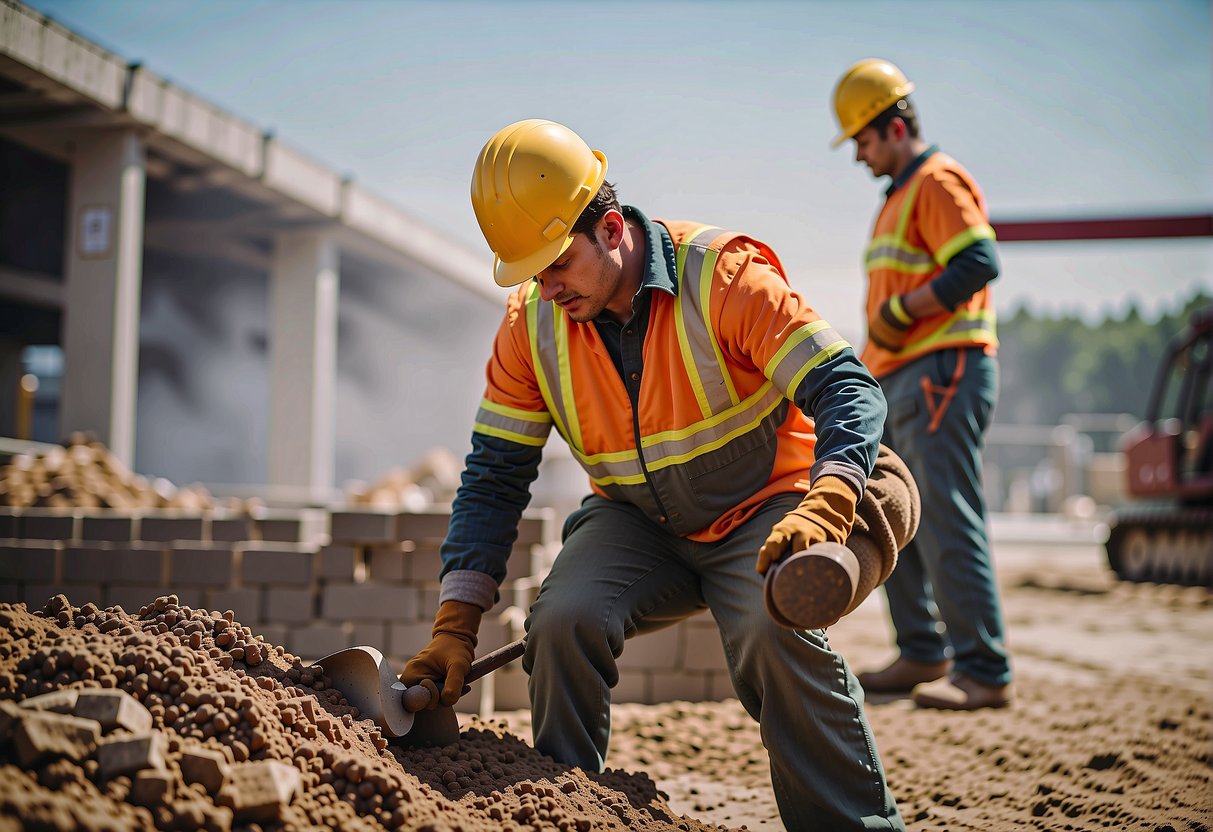📦 FREE Shipping
How Many Calories Do Construction Workers Burn in 2024?

Building and crafting on the job site requires significant physical effort, but how does it translate to calories burned? “How Many Calories Do Construction Workers Burn? Surprising Insights” digs into the demanding world of construction work and its energy expenditure.
How Many Calories Do Construction Workers Burn?
Calories burned during construction work measure the energy expended in this physically demanding job. As a construction worker, you are often involved in diverse tasks that require varying levels of physical activity. This intense manual labor can lead to a high caloric burn due to the energy cost of moving, lifting, and carrying heavy objects.
- Physical Activity & METs: The MET (Metabolic Equivalent of Task) value is a standard way to estimate energy expenditure. Most construction activities range in intensity, typically considered moderate to high intensity.
- Influence of Body Mass: Your muscle and body mass affect metabolic rate, influencing how many calories you burn during work.
- Intensity of Tasks: Whether it’s light movement or heavy lifting, the intensity of your activity level directly impacts your caloric expenditure. Some everyday tasks and their estimated calories burned per hour include:
Activity Calories Burned (per hour) Light tasks (e.g., tool sharpening) 150-200 Medium tasks (e.g., laying carpet) 350-450 Heavy tasks (e.g., hanging sheet rock) 400-600
Your metabolic rate also plays a crucial role as it could vary the energy levels, hence the calories burned could fluctuate. The harder and more demanding the construction task, the higher your energy cost will be due to increased physical demands.
Factors Influencing Calorie Expenditure

Impact of Individual Characteristics
Body Composition and Basal Metabolic Rate (BMR): Your BMR represents the number of calories you’d burn at rest, like your body’s idle mode.
Age, weight, and fitness level directly impact your BMR. For example, more muscle mass reduces to higher calorie burn, even when you’re just standing there!
Health and Fitness Level: Your overall health and how frequently you exercise, whether that’s cycling, gardening, or jumping rope also plays a vital role. A higher fitness level often corresponds with a more efficient calorie burn, meaning more intense workout sessions will pay off on-site, too.
Nature of Construction Tasks and Environment
Physical Demands of the Job: Construction tasks range from light carpentry to heavy machinery wielding. The Metabolic Equivalent of Task (MET) value varies for different activities; lifting and carrying burn far more calories than standing or walking.
Environmental Factors: External conditions like extreme temperature or working at elevated heights add an extra layer of effort. Climbing stairs or maintaining balance on beams increases your calorie expenditure.
Diet and Hydration in Construction
Balanced Diet: Start your day with a nutritious breakfast, and keep those snacks handy! Opt for a mix of proteins, carbohydrates, and healthy fats. This combo keeps you fueled for all the physically demanding tasks ahead.
Hydration: Never underestimate the power of hydration. Dehydration can lead to fatigue, lowering your work efficiency. A steady water intake throughout the day is crucial, so keep that water bottle filled and close by!
Comparison with Other Professions
- Office Work: Generally has a lower calorie burn due to its sedentary nature.
- Public Health Professionals: Nurses and police officers have a moderate to high-active day with considerable calorie expenditure.
- Custodians: Often a mix of light and heavy-duty tasks leads to a moderate calorie burn similar to less demanding construction tasks.
Your job’s physicality towers over many other professions and understanding these factors can help you optimize your health, keeping your energy levels sky-high!
Optimizing Calorie Utilization and Health

Effective Nutritional Strategies
Nutrition is vital for optimizing calorie burn and maintaining energy levels. Start your day with a high-protein breakfast to fuel your morning tasks. Snacks like nuts, fruits, and whole grains will keep your energy steady throughout the day. Aim for a balanced diet that includes:
- Proteins: to repair and build muscle.
- Carbohydrates: for immediate energy.
- Healthy Fats: to support cell growth and hormone production.
Ensure your calorie intake aligns with your energy expenditure to avoid weight gain. Drinking water regularly helps prevent dehydration, which can lead to decreased performance.
Physical Conditioning and Recovery
Your fitness level and muscle mass significantly affect how effectively you burn calories. Engage in regular fitness routines to increase your metabolic rate and improve muscle strength, enabling you to take on physically demanding tasks easily.
Don’t underestimate recovery and sleep. They are essential for muscle repair and can prevent health issues like high blood pressure and overweight conditions. Balance your workload with sufficient rest to combat fatigue and maintain high energy levels.
Health Benefits and Risks
Occupationally, you are less likely to deal with the risks associated with sedentary jobs, like colon cancer or becoming overweight. Embrace the healthy side-effects of your job as you burn calories and enhance your fitness levels.
However, with labor comes the risk of overexertion. Maintain hydration and proper nutrition to avoid issues like heat stroke or severe fatigue. Monitor your health, stay on top of public health recommendations, and maintain a healthy work-life balance to optimize your overall well-being.
FAQ:
How many calories do you burn construction?
You can burn between 300 to 600 calories per hour doing construction work, depending on the task’s intensity.
How many calories should a construction worker eat a day?
A construction worker should consume between 2,500 to 4,500 calories a day, tailored to their specific energy expenditure.
How many calories does labouring burn?
Labouring can burn over 500 calories per hour, with more intense activities like digging potentially exceeding 1000 calories.
What job burns the most calories?
Jobs with high physical demands like agriculture, construction, and forestry typically burn the most calories, though exact figures vary by specific job tasks.
If this article about the question: “How Many Calories Do Construction Workers Burn?” helped you, don’t forget to leave a comment below about what you think of the article.

